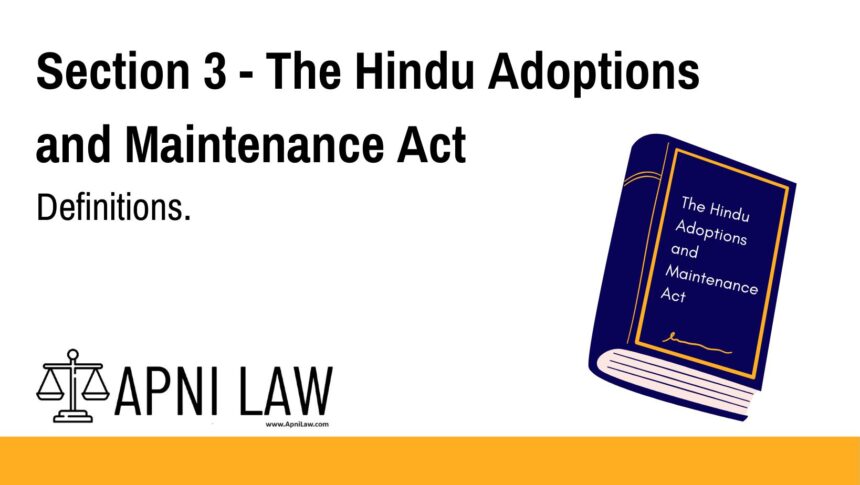Code: Section 3 – Definitions
In this Act, unless the context otherwise requires,—
(a) the expressions “custom” and “usage” signify any rule which, having been continuously and uniformly observed for a long time, has obtained the force of law among Hindus in any local area, tribe, community, group or family:
Provided that the rule is certain and not unreasonable or opposed to public policy: and
Provided further that, in the case of a rule applicable only to a family, it has not been discontinued by the family;
(b) “maintenance” includes—
(i) in all cases, provision for food, clothing, residence, education and medical attendance and treatment;
(ii) in the case of an unmarried daughter, also the reasonable expenses of and incident to her marriage;
(c) “minor” means a person who has not completed his or her age of eighteen years.
Explanation of Section 3 – Definitions
Section 3 of the Hindu Adoptions and Maintenance Act, 1956, defines key legal terms that are used throughout the statute. This section ensures clarity by setting precise interpretations for the expressions “custom and usage,” “maintenance,” and “minor.”
Key Definitions:
- Custom and Usage
These terms refer to rules that are:- Continuously and uniformly followed over time.
- Accepted as binding by a local area, community, tribe, or family.
- Certain, not opposed to public policy, and not unreasonable.
- Still practiced in the case of family-specific customs.
- Maintenance
This term includes:- Essentials such as food, clothing, shelter, education, and medical care.
- For an unmarried daughter, it additionally includes reasonable marriage-related expenses.
- Minor
A minor is defined as any person under the age of 18 years.
Illustration
Example 1: Valid Custom
A Hindu community in a particular region has for generations followed a practice regarding adoption age that is not found in the statutory law but has the force of law due to its continuous observance. If the custom meets the tests of reasonableness, certainty, and public acceptability, it can be recognized under clause (a).
Example 2: Maintenance for Unmarried Daughter
An unmarried daughter requiring financial support for education and medical treatment would be entitled to claim maintenance. If her marriage is arranged, the reasonable costs associated with the marriage would also be covered under this definition.
Example 3: Minor Child
A 17-year-old boy is considered a minor under the Act and therefore may be adopted, maintained, or represented legally as such, based on this definition.
Common Questions and Answers
1. What constitutes a valid “custom or usage” under this Act?
A custom or usage must be consistently followed over time, be certain in nature, reasonable, not against public policy, and (if family-specific) still in practice.
2. Does maintenance only include food and shelter?
No. It includes food, clothing, residence, education, medical treatment, and in the case of an unmarried daughter, marriage-related expenses.
3. Who is considered a minor under this Act?
Anyone who has not attained the age of 18 years is considered a minor.
4. Can family customs override the statutory provisions?
Only if the custom meets legal requirements: it must be long-standing, reasonable, certain, and not discontinued in the case of family customs.
Conclusion
Section 3 of the Hindu Adoptions and Maintenance Act, 1956 lays the foundation for interpreting key legal terms used throughout the Act. Understanding these definitions is essential for applying the law correctly, particularly in matters of adoption, maintenance, and determining eligibility based on age or custom.
For more legal insights and detailed analysis of Hindu personal laws, visit ApniLaw.








